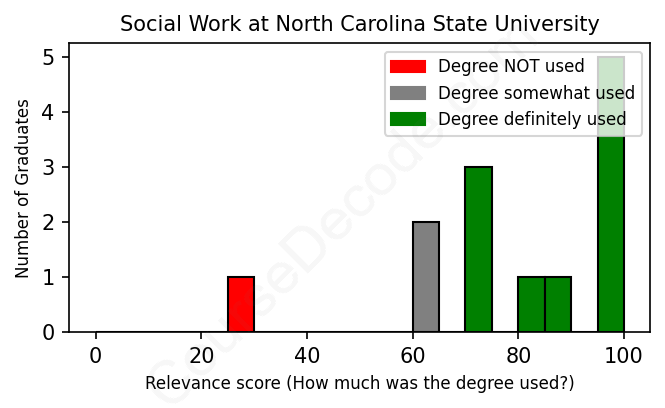
First, some facts. Of the Social Work graduates from North Carolina State University we've analyzed , here's how many have used (or NOT used) their degree in their career:

These are estimates based on AI analysis of 13 LinkedIn profiles (see below).
The verdict? Significantly above average. Overall, with an average relevance score of 79%, Social Work graduates from North Carolina State University have a much higher likelihood (+12%) of finding work in this field compared to the average graduate across all fields:
And for comparison, here's the chart for all profiles we've looked at across all degrees.
Also, after graduating, 53% of these graduates have pursued further education other than another Bachelor's degree (such as a Masters degree or other), compared to the average across all profiles of 35%. This suggests you may need more than just a Bachelors degree to be competitive as a Social Work graduate.
See the details:
|
Relevance score: 73% We think this person has gone into a career highly relevant to their degree. We think this person has gone into a career highly relevant to their degree.
DEGREE INFOGraduated in 2018 from North Carolina State University with a Bachelor's degree in Social Work. Also pursued further education since (see below). JOB HISTORY SINCE GRADUATIONIntern Ruth Sheets Adult Care Center Aug 2018 - Dec 2018 Food Operations  IKEA Jun 2019 - Sep 2019 Human Resources Expert  Target Oct 2019 - Oct 2020 Human Resources Team Lead  Target Oct 2020 - Oct 2021 MSW Intern  KidSCope Jun 2023 - Dec 2023 Social Worker/Intake Specialist  Legal Aid of North Carolina Oct 2021 - Present FURTHER DEGREES DONE SINCE GRADUATINGMaster of Social Work - MSWFlorida State University 2022 - 2023 ABOUTMy main goal in life is to be able to influence others to become productive members in our society while strengthening my interpersonal skills and cultural competence |
The top 10 most common jobs done by the graduates we've analyzed (ranked most common to least) are:
When looking at the job paths of graduates from North Carolina State University with a degree in Social Work, it seems most of them have gravitated towards positions that strongly connect with social work principles. Common roles include direct service positions such as Social Workers, Case Managers, and School Social Workers, which involve supporting individuals and communities, advocating for at-risk populations, and promoting mental health and well-being. These jobs typically require the skills and knowledge that come directly from social work training, showcasing a clear relevance to their education. For example, many have taken on roles in organizations like Legal Aid and Haven House Services, which are deeply rooted in social justice and client support, further solidifying the connection between their degrees and job functions.
However, it’s worth noting that not all graduates followed this trajectory. Some pursued jobs that are only marginally related to social work, like roles in Human Resources or administrative positions. These roles may draw on transferable skills like communication and organization but don’t fully utilize the specific knowledge from a Social Work degree. Overall, though, the trends lean heavily toward relevant and meaningful positions within the social work field, reflecting a strong commitment to the profession among these graduates.
Here is a visual representation of the most common words in job titles for Social Work graduates (this is across all Social Work graduates we've analyzed, not just those who went to North Carolina State University):

Graduates from North Carolina State University with a degree in Social Work tend to follow a pretty promising career trajectory, especially in their first few years out of school. Many of them land roles that are directly related to social work, such as case managers, school social workers, or social work interns, right after graduation. For instance, a graduate from 2013 has been working as a school social worker since early 2014, and a 2015 grad is still with Wake County in a social work capacity. It looks like the initial jobs often provide hands-on experience and skills in various settings, which is crucial in this field and helps lay a solid foundation for their careers.
Fast forward about five to ten years later, and you can see a trend of progression into more specialized or advanced roles. For example, graduates have moved into positions like Program Director, Social Services Designee, and even national program coordinators. Some have taken on managerial roles or leadership positions in various organizations, indicating that they're not just sticking to entry-level jobs indefinitely. However, there are a few outliers, like those who have ventured into administrative and human resources roles, which might stray from the core focus of social work. Overall, though, a good number of graduates seem to be thriving in social work-related careers, making a difference in their communities while building solid, fulfilling careers in fields that align with their degrees. So if you're considering social work, it looks like NC State is a great choice!
Getting a Bachelor’s degree in Social Work can be a bit of a mixed bag, and honestly, it tends to hover around the average difficulty level. At North Carolina State University, like many other schools, you'll find that the coursework combines foundational theories, practical skills, and some serious hands-on experiences through internships. It can be challenging because you’ll dive into subjects that require a lot of empathy and critical thinking, plus you'll have to stay organized with assignments and fieldwork. Some students find it easier because they connect well with the material, while others might struggle a bit more with the emotional intensity of the topics covered. Overall, if you're passionate about helping others and ready to engage deeply with the material, you can definitely handle it!
Most commonly, in the LinkedIn profiles we've looked at, it takes people 2 years to finish a Bachelor degree in Social Work.
Looking at the job history of these Social Work grads from North Carolina State University, it seems like they've had a pretty mixed bag in terms of earnings. Some of the earlier grads have stuck around in roles that seem more geared toward gaining experience or working in non-profits, which typically don’t pay as much, like the Day Treatment Instructor and Case Manager positions. Others, especially those who have landed management or coordinator roles, might be pulling in decent salaries. For instance, the 2020 grad now working as a National Program Coordinator at ALDI USA might be making a good amount. Overall, it looks like they’re building their careers and gaining valuable experience, but it’s likely that many of them are starting out on the lower end of the pay scale, especially in those entry-level or non-profit roles. So, while some might be doing okay, it seems like not everyone is raking in the big bucks right off the bat.
Here is a visual representation of the most common words seen in the "about" section of LinkedIn profiles who have a Bachelor degree in Social Work (this is across all Social Work graduates we've analyzed, not just those who went to North Carolina State University). This may or may not be useful:

Here are all colleges offering a Bachelor degree in Social Work (ordered by the average relevance score of their Social Work graduates, best to worst) where we have analyzed at least 10 of their graduates: